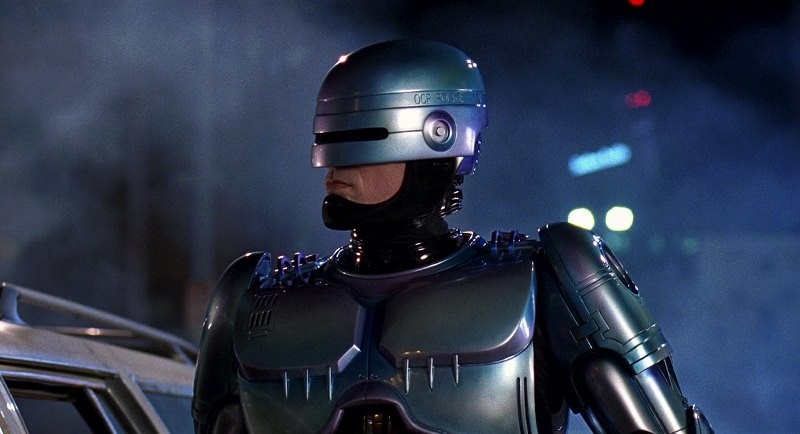This week marks the 30th anniversary of the release of the sci-fi classic RoboCop. The '80s were a fertile time for science-fiction flicks, and you could probably compile a Top 10 genre list from that decade alone: The Thing, Blade Runner, The Empire Strikes Back, The Terminator, Brazil, The Fly, Aliens, Predator, The Road Warrior, The Ice Pirates (don’t @ me). It can be argued, however, that none were as predictive of the actual future as Paul Verhoeven’s ultraviolent cyborg-Jesus analogy.
Set in “near future” Detroit (but mostly filmed in and around Dallas), RoboCop is the story of Alex Murphy (Peter Weller), a cop recently transferred to the city’s most violent precinct amidst a corporate takeover of the police department by Omni Consumer Products. Killed by a brutal (yet refreshingly multicultural) gang on his first day, Murphy becomes the prototype for OCP’s new cyborg “RoboCop” program. Proposed as a way to clean up “Old Detroit” before OCP’s Delta City initiative, RoboCop is actually entangled in an internal OCP power struggle, which eventually brings him back into contact with Clarence Boddicker (Kurtwood Smith), the man who murdered him.
But more than the fairly simple plot, more than Rob Bottin’s effects work (he designed the RoboCop suit and — fun fact — based Emil’s toxic-waste final form on The Incredible Melting Man), more than “I’d buy that for a dollar!” was how prescient it was, especially compared to its contemporaries.
The predictive accuracy of science fiction movies, unsurprisingly, is usually in inverse proportion to how theoretical the depicted science or technology is. 2001: A Space Odyssey ended up being pretty accurate because Arthur C. Clarke and Stanley Kubrick ensured the non-alien tech was based in current astronomical thinking. The Martian will probably end up looking similar to eventual travel to the Red Planet (assuming we still have a space program in eight years), as inflatable HABs are already in development and much of the space travel physics are based on actual science.
On the other hand, Blade Runner posited we’d have flying cars, androids and off-world settlements by 2019. Total Recall (1990, but I'll allow it) doesn’t take place for another 67 years, but we’ll see Johnny Cabs before we do Mars colonies, and the Terminator franchise has folded back on its own timeline so many times not even those associated with it know what the hell’s going on.
RoboCop's comparative success lies in the fact writers Edward Neumeier and Michael Miner kept their expectations low. Granted, we're a ways off from cybernetic organisms walking the streets (or are we?), but advances in prosthetics and biomedical engineering have taken the concept out of the realm of pure speculation.
But by basing their tale on the future viability of corporate greed and civic corruption, Neumeier and Miner put themselves in a can't-lose scenario. The presumption of government dishonesty was endemic among Americans even before our current President changed the national currency to the ruble (probably), and while massive megacorporations like Omni Consumer Products are more or less prevented by anti-trust laws, the privatization of prisons and education, and plans to send private contractors to Afghanistan in place of soldiers, show how far the guiding principles of OCP have come.
But what makes RoboCop so entertaining, and so watchable, three decades on is a satirical tone that forces us to laugh through the horror. Cameras rushing forward to capture the death of a disgruntled city councilman RoboCop punches through a window; TV commercials showcasing an 8.2 MPG luxury car (“an American tradition”), a family nuclear-war game (“NukEm”), and 5,000 SPF sunblock that coincidentally causes skin cancer; or news anchors sunnily describing the “accidental” assassination of several former Presidents by a malfunctioning satellite, these combined with the vast swaths of abandoned industrial space and clear evidence of economic hardship – hardship that can only be mitigated by friendly corporations, naturally – show Verhoeven and company weren’t just informing our future; they were shining a light on Reagan’s America itself.
Two lackluster sequels (RoboCop 2 was an especially mean-spirited misfire), one reboot, two Canadian TV series and two cartoons later, the original RoboCop remains the best of the franchise. Even among its contemporaries, it stands apart as a singular achievement in sci-fi cinema, social commentary and technical excellence. Give it another look-see this week and have a good chuckle at the far-fetched idea of corporate America taking over vital public services.
Support Us
Houston's independent source of
local news and culture
account
- Welcome,
Insider - Login
- My Account
- My Newsletters
- Contribute
- Contact Us
RoboCop Keeps Getting More Relevant (And Funnier) With Age

A cyborg looks at 30.
[
{
"name": "Related Stories / Support Us Combo",
"component": "11591218",
"insertPoint": "4",
"requiredCountToDisplay": "4"
},{
"name": "Air - Billboard - Inline Content",
"component": "11591214",
"insertPoint": "2/3",
"requiredCountToDisplay": "7"
},{
"name": "R1 - Beta - Mobile Only",
"component": "12287027",
"insertPoint": "8",
"requiredCountToDisplay": "8"
},{
"name": "Air - MediumRectangle - Inline Content - Mobile Display Size 2",
"component": "11591215",
"insertPoint": "12",
"requiredCountToDisplay": "12"
},{
"name": "Air - MediumRectangle - Inline Content - Mobile Display Size 2",
"component": "11591215",
"insertPoint": "4th",
"startingPoint": "16",
"requiredCountToDisplay": "12"
}
,{
"name": "RevContent - In Article",
"component": "12527128",
"insertPoint": "3/5",
"requiredCountToDisplay": "5"
}
]

